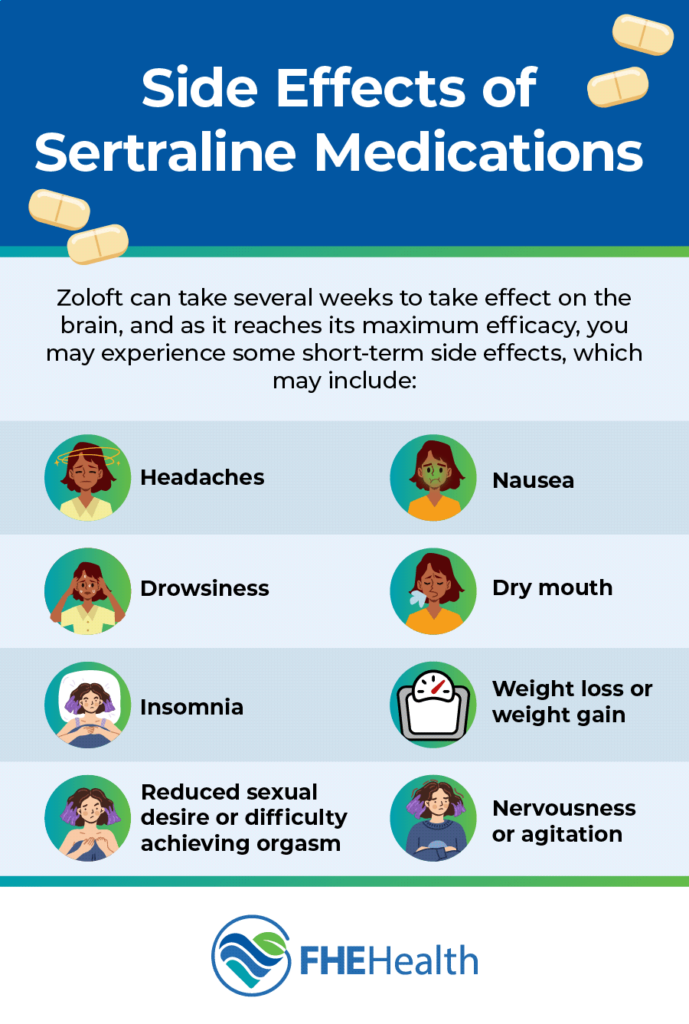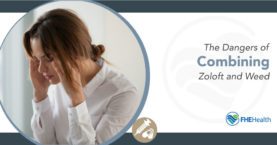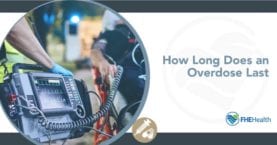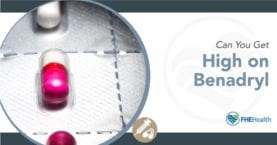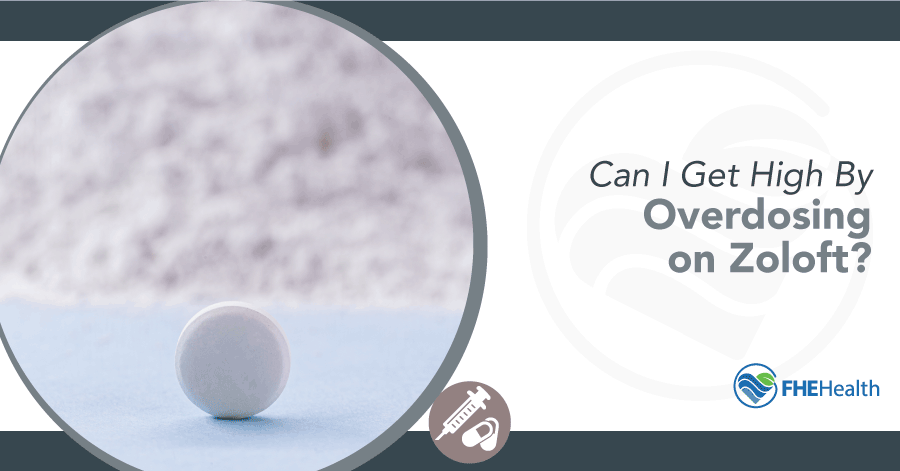
For anyone struggling with depression, obsessive-compulsive disorder (OCD), or panic attacks, Zoloft is a common choice for doctors to prescribe. While it can be an excellent option for individuals seeking to manage their mental health and enjoy a better quality of life, abusing Zoloft can result in dangerous side effects for those chasing a Zoloft high. Learn about the possibility of getting high from overdosing on Zoloft, the associated risks, and how to seek help if you find yourself in this challenging position.
What Is Zoloft and What Does It Do?
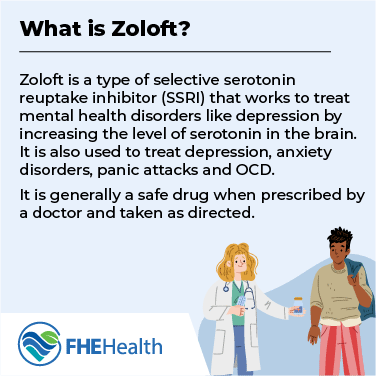
Zoloft is one of several brand names for a drug called sertraline, which treats depression, anxiety disorders, panic attacks, and OCD. It may also manage conditions such as post-traumatic stress disorder (PTSD) or social anxiety. Sertraline is generally a safe drug when prescribed by a doctor and taken as directed. However, it has the potential for misuse or for a user to develop a dependence or experience withdrawal if they suddenly stop taking the medication.
Zoloft is a type of selective serotonin reuptake inhibitor (SSRI) that works to treat mental health disorders like depression by increasing the level of serotonin in the brain. Serotonin is a neurotransmitter that carries signals between your brain cells. The role of an SSRI medication is to prevent the absorption of serotonin, making it more readily available in the brain.
Potential Side Effects of Sertraline Medications
As with most SSRIs, Zoloft can take several weeks to affect the brain, and as it reaches its maximum efficacy, you may experience some short-term side effects. These will typically subside after 4 to 6 weeks. They include:
- Headache
- Nausea
- Insomnia
- Dry mouth
- Drowsiness
- Weight loss or weight gain
- Nervousness or agitation
- Reduced sexual desire or difficulty achieving orgasm
Everyone’s experience adapting to Zoloft is different, and you should work with your doctor to determine the correct dosage and time of day to take the medication to reap the maximum benefits with minimum side effects.
While the short-term side effects of sertraline will likely subside after your body adapts to the drug and dosage, taking a larger dose of Zoloft with the intent of experiencing the effects of a traditional drug “high” has other consequences.
Can You Overdose on Zoloft?
Like many SSRI medications, Zoloft is considered a relatively safe medication. It’s available in 25-, 50- and 100-milligram tablets. For most adults, the standard dose is 50 milligrams daily. However, this amount may be adjusted gradually up to a maximum dose of 200 milligrams a day and is based on weight, age and the presence of other existing health conditions and medications. When an individual takes more than the prescribed amount of this or any antidepressant, an overdose may occur, especially if taken with alcohol or another medication.
Recognizing a Zoloft High: Identifying Signs of an Overdose
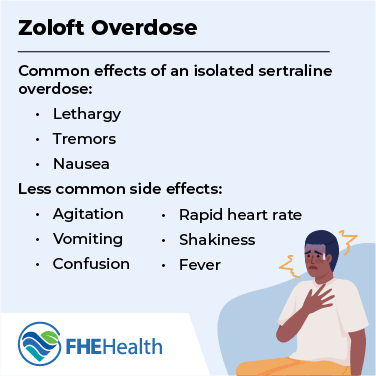
Zoloft isn’t an addictive substance or a narcotic, so attempting to experience a Zoloft high by consuming more than your recommended dose is inadvisable — not because you’ll overdose but because you may experience negative side effects. It’s extremely rare to experience a fatal overdose on Zoloft alone. If you’re going to overdose on Zoloft, it’s likely to be in combination with another drug or alcohol.
Some of the common side effects of an isolated sertraline overdose:
- Lethargy
- Tremors
- Nausea
Agitation, vomiting, and confusion are also cited as potential repercussions of exceeding your Zoloft dosage, but these are less common. A person who’s overdosing on Zoloft may also experience a rapid heart rate, shakiness, fever, or dizziness.
It’s also possible that in severe cases, the individual could develop:
- Serotonin syndrome
- Seizures
- Heart problems
- Fainting
- Inflammation of the pancreas
- Changes in their blood pressure
What Is Serotonin Syndrome?
Serotonin syndrome isn’t common for those taking Zoloft, but if you overdose on the drug, you could develop a life-threatening condition. When you have serotonin syndrome, you have levels of the neurotransmitter serotonin in the brain that are so high they’re dangerous. This is more likely to occur if you consume another drug that also has the function of an SSRI in combination with Zoloft.
Warning signs of serotonin syndrome include hallucinations, muscle stiffness, seizures, confusion, and coma. If you or a loved one experiences any of these symptoms, you should seek emergency medical attention immediately.
If you overdose on Zoloft or consume another drug in combination with it, don’t wait. You should contact poison control or visit an emergency facility before the effects take hold. If you act quickly, you can potentially have your stomach pumped before the medication is absorbed into your bloodstream. However, this will typically only work if the overdose is an accident. Most people chasing a Zoloft high or sense of euphoria by overdosing will experience side effects before they realize they need medical help.
Providing Steps for an Emergency Response
If your overdose on Zoloft was accidental, your doctor may switch you to another SSRI or discuss alternatives. They may provide recommendations for precautions moving forward to prevent a repeat. This could include avoiding recreational drug use and adhering to your prescribed dosage.
If the overdose was intentional, you may need to be hospitalized and put on suicide watch to prevent further harm to yourself. Typically, an intentional overdose while on an antidepressant indicates that the drug isn’t performing its intended function successfully. After you’re no longer suicidal, your doctor may discuss other options for managing your depression if sertraline, or specifically Zoloft, isn’t having the desired effect.
If you have persistent suicidal thoughts, you can call the National Suicide Prevention Line at (800) 273-8255 for support anytime. If you can, talk to a loved one, a trusted friend or your therapist about options for treatment. Managing your depression may involve SSRIs in combination with talk therapy.
Treatment Options and Next Steps
If your overdose on Zoloft was accidental, your doctor may switch you to another SSRI or discuss alternatives. They may provide recommendations for precautions moving forward to prevent a repeat. This could include avoiding recreational drug use and adhering to your prescribed dosage.
If the overdose was intentional, you may need to be hospitalized and put on suicide watch to prevent further harm to yourself. Typically, an intentional overdose while on an antidepressant indicates that the drug isn’t performing its intended function successfully. After you’re no longer suicidal, your doctor may discuss other options for managing your depression if sertraline, or specifically Zoloft, is not having the desired effect.
If you have persistent suicidal thoughts, you can call the National Suicide Prevention Line at (800) 273-8255 for support at any time. If you can, talk to a loved one, a trusted friend or your therapist about options for treatment. Managing your depression may involve SSRIs in combination with talk therapy.
Recognize the Need for Professional Assistance
If you’re seeking guidance on whether you can get high off a Zoloft overdose, it might be time to consider professional support. At FHE Health, our dedicated team can help you develop a treatment plan to suit your needs and get you where you want to be. Whether you’re looking to detox from drugs and alcohol or speak to a therapist through outpatient treatment, we can work together to determine the course of action that’s best for you.
If you or someone you love struggles with substance abuse or has dealt with the aftermath of a Zoloft high, contact us at FHE Health today. Our counselors are available 24-7 to discuss your options and to help you start your path toward healing.
FAQs About Chasing a High From Zoloft
Q: Will taking a handful of Zoloft actually get me high?
A: No. Unlike opioids or benzodiazepines that trigger an immediate dopamine rush, Zoloft is a slow-acting SSRI. It is designed to stabilize your mood over weeks, not minutes. Taking a massive dose won’t give you a sense of euphoria or invincibility; it acts more like a poisoning. You won’t get a “buzz”, but you will likely just end up vomiting, shaking, and feeling incredibly sick.
Q: What does a “Zoloft overdose” actually feel like then?
A: It feels like a medical emergency. Users who attempt to abuse sertraline often report “The Zoloft Shakes”: uncontrollable tremors combined with extreme lethargy. You might feel agitated and confused, with a racing heart and severe nausea. Your body is trying to reject a toxic level of medication.
Q: I’ve heard about Serotonin Syndrome. Is that just a bad trip?
A: No, it is a life-threatening medical condition. Think of your brain like a bucket; Zoloft fills it with serotonin. If you overdose, that bucket overflows and floods your system. This doesn’t cause “fun” hallucinations; it causes dangerous seizures, muscle rigidity (stiffness), high fevers, and confusion. It requires immediate ER attention, not a dark room to “ride it out.”
Q: Why isn’t my prescription making me happy immediately?
A: SSRIs typically take 4 to 6 weeks for the drug to build a foundation in your brain. If you don’t feel better yet, taking more pills won’t speed up the process; it will only introduce toxicity. If you feel the urge to overdose because the medication “isn’t working,” that is a major red flag that you need to speak to your doctor about changing your dosage or medication type.
Q: What happens if I drink alcohol after having taken one too many Zoloft?
A: While Zoloft is rarely fatal on its own, alcohol acts as a “force multiplier” for negative side effects. Mixing these two drugs confuses your central nervous system and dramatically increases the risk of blacking out, respiratory depression, and sudden blood pressure changes.
Q: What should I do if I’ve taken more than my prescribed dose?
A: If it was an accident, call your doctor or Poison Control immediately. However, if you took more because you were trying to feel something, or trying to stop feeling anything at all, this is a sign that your current treatment plan isn’t working for you. There is no shame in admitting that; the most important step is reaching out to a professional who can help you adjust your path before a mistake turns into a tragedy.
